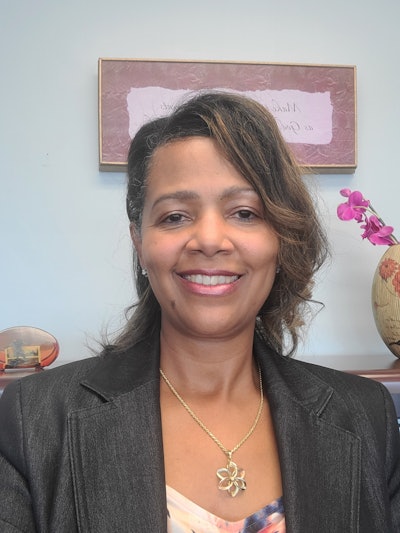During the past century, the roles of community college presidents have changed significantly. Leaders have had to keep pace with a changing economy and workforce, readjusting their strategies to focus less on traditional economic models while navigating recent poly-pandemics (COVID-19 and racial injustice) that have spotlighted issues permeating higher education. What remained an enigma, until recently, are voices of younger Gen X and Millennial leaders. In a 2021 study, Minority Community College CEOs Perceptions of Underrepresentation, Preparation and Ascension to the Presidency, 34 currently serving and/or emeritus African American, Asian Pacific Islander and Latino/Hispanic CEOs were interviewed —13 of the CEOs reflected the newest and least-explored generation. The research offered a glimpse into the leadership style of these younger leaders.
 CharMaine Hines
CharMaine Hines
Many CEOs’ experiences and journeys mirror those of their students, providing them a keen perspective on how to maintain an open door, open access and success agenda. As one Latino male president noted: "Seventy percent of my students are still first-generation college students in 2020. Eighty-seven percent of them are on some type of financial aid or scholarship — I just feel it's a tremendous responsibility, but a real opportunity as well to serve this community who needs us [leaders of color] so desperately."
Leaders caution against describing equity as limited to the student experience because, as an African American male president said, “We then make it palatable to deal with the population but not with the problem.” Yet, they highlight the transformative potential of higher education, as in the words of this Asian Pacific Islander female CEO: "Education is key to any anti-poverty work. … I'm privileged to be able to contribute."
Compared to presidents from older generations, the Gen X and Millennial presidents who participated in the study offered perspectives that were more attuned to creating environments that foster inclusive and diverse climates that support equity in student resources and achievement. Study findings provided the following insights about these younger leaders:
• They use an equity-minded approach to leadership and strategy to align the mission of the institution around student success for all learners.
• They are cognizant of and attuned to identifying and eradicating symbols in institutional culture that malign diverse and inclusive environments.
• They value being role models for students, the community and future leaders ascending to the presidency.
• They see formal and informal leadership preparation as necessary and significant to be successful in the community college presidency.
• They support the need for culturally relevant pedagogy, instruction and training in cultural competency to eliminate prejudicial stereotypes, biases and microaggressions.
As one African American president said: “What we have in common is a consistent core commitment to serving all students — it is … these experiences that make our students more creative, resourceful and committed to completion.”
The diverse perspectives and leadership today’s CEOs wield have been forged through poly-pandemics unlike those any other generations of leaders have experienced. Current cultural shifts offer opportunities to improve racial and cultural awareness and create more diverse, inclusive and equitable environments in today’s community colleges. Increasing diversity of representation of leaders of color in the presidency, adopting equity-minded practices that lead to parity in student educational outcomes and creating inclusive climates that value diverse voices are goals all leaders in higher education should embrace. Gen X and Millennial leaders have been mentored by the best that came before them. With the skills they’ve honed and cultural wealth they possess, these and successive generations of community college leaders are poised to refocus their institutions on the promise of higher education as institutions that are diverse, equitable and inclusive.
Dr. CharMaine Hines is a graduate of the John E. Roueche Center for Community College Leadership at Kansas State University and serves as vice chancellor of academic accountability and policy at the Wayne County Community College District in Detroit, Michigan.
The Roueche Center Forum is co-edited by Drs. John E. Roueche and Margaretta B. Mathis of the John E. Roueche Center for Community College Leadership, Department of Educational Leadership, College of Education, Kansas State University.
This article originally appeared in the October 28, 2021 edition of Diverse. Read it here.







